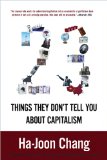
Review posted March 8, 2013.
Bloomsbury Press, New York, 2010. 286 pages.
I have to recommend this book, because it was a huge eye-opener. I'm not sure I absorbed everything, mind you, but I was impressed.
Ha-Joon Chang is a professor of Economics at the University of Cambridge. In all of the short chapters, teaching some truths about economics, he uses examples from international economics and international politics. Here is someone who knows what he's talking about! He uses statistics and clear counter-examples to show why some things commonly believed about capitalism are simply not true.
I'll quote some excerpts from the Introduction to give you an idea what's going on in this book. I do recommend this book highly for anyone who does any thinking about public policy.
This book is not an anti-capitalist manifesto. Being critical of free-market ideology is not the same as being against capitalism. Despite its problems and limitations, I believe that capitalism is still the best economic system that humanity has invented. My criticism is of a particular version of capitalism that has dominated the world in the last three decades, that is, free-market capitalism. This is not the only way to run capitalism, and certainly not the best, as the record of the last three decades shows. The book shows that there are ways in which capitalism should, and can, be made better. . . .
Once you know that there is really no such thing as a free market, you won't be deceived by people who denounce a regulation on the grounds that it makes the market 'unfree' (see Thing 1). When you learn that large and active governments can promote, rather than dampen, economic dynamism, you will see that the widespread distrust of government is unwarranted (see Things 12 and 21). Knowing that we do not live in a post-industrial knowledge economy will make you question the wisdom of neglecting, or even implicitly welcoming, industrial decline of a country, as some governments have done (see Things 9 and 17). Once you realize that trickle-down economics does not work, you will see the excessive tax cuts for the rich for what they are -- a simple upward redistribution of income, rather than a way to make all of us richer, as we were told (see Things 13 and 20). . . .
Human decisions, especially decisions by those who have the power to set the rules, make things happen in the way they happen, as I will explain. Even though no single decision-maker can be sure that her actions will always lead to the desired results, the decisions that have been made are not in some sense inevitable. We do not live in the best of all possible worlds. If different decisions had been taken, the world would have been a different place. Given this, we need to ask whether the decisions that the rich and the powerful take are based on sound reasoning and robust evidence. Only when we do can we demand right actions from corporations, governments and international organizations. Without our active economic citizenship, we will always be the victims of people who have greater ability to make decisions, who tell us that things happen because they have to and therefore that there is nothing we can do to alter them, however unpleasant and unjust they may appear.
This book is intended to equip the reader with an understanding of how capitalism really works and how it can be made to work better. . . .
Most of the issues I discuss in the book do not have simple answers. Indeed, in many cases, my main point is that there is no simple answer, unlike what free-market economists want you to believe. However, unless we confront these issues, we will not perceive how the world really works. And unless we understand that, we won't be able to defend our own interests, not to speak of doing greater good as active economic citizens.
If you'd like to educate yourself to be a good economic citizen, this book is a great place to start. If you'd simply like to have some food for thought and some solid evidence behind your opinions, this book is also a great place to start. I'm not at all sure I grasped all the arguments or would be able to articulate them myself. But I at least was convinced myself! And my eyes were opened to worldwide economic situations I had known nothing about.
